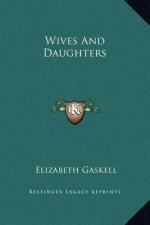Cynthia’s relations with the squire had been very stationary ever since the visit she had paid to the Hall the previous autumn. He had received them all at that time with hospitable politeness, and he had also been more charmed with Cynthia than he liked to acknowledge to himself when he thought the visit all over afterwards.
‘She’s a pretty lass sure enough,’ thought he, ’and has pretty ways about her too, and likes to learn from older people, which is a good sign; but somehow I don’t like madam her mother, but still she is her mother, and the girl is her daughter; yet she spoke to her once or twice as I should not ha’ liked our little Fanny to have spoken, if it had pleased God for her to ha’ lived. No, it’s not the right way, and it may be a bit old-fashioned, but I like the right way. And then again she took possession o’ me as I may say, and little Molly had to run after us in the garden walks that are too narrow for three, just like a little four-legged doggie; and the other was so full of listening to me, she never turned round for to speak a word to Molly. I don’t mean to say they’re not fond of each other, and that’s in Roger’s sweetheart’s favour, and it’s very ungrateful in me to go and find fault with a lass who was so civil to me, and had such a pretty way with her of hanging on every word that fell from my lips. Well! a deal may come and go in two years! and the lad says nothing to me about it. I’ll be as deep as him, and take no more notice of the affair till he comes home and tells me himself.’
So although the squire was always delighted to receive the little notes which Cynthia sent to him every time she heard from Roger, and although this attention on her part was melting the heart he tried to harden, he controlled himself into writing her the briefest acknowledgements. His words were strong in meaning, but formal in expression; she herself did not think much about them, being satisfied to do the kind actions that called them forth. But her mother criticized them and pondered them. She thought she had hit on the truth when she had decided in her own mind that it was a very old-fashioned style, and that he and his house and his furniture all wanted some of the brightening up and polishing which they were sure to receive, when—she never quite liked to finish the sentence definitely, although she kept repeating to herself that ‘there was no harm in it.’
To return to the squire. Occupied as he now was, he recovered his former health, and something of his former cheerfulness. If Osborne had met him half-way, it is probable that the old bond between father and son might have been renewed; but Osborne either was really an invalid, or had sunk into invalid habits, and made no effort to rally. If his father urged him to go out—nay, once or twice he gulped down his pride, and asked Osborne to accompany him—Osborne would go to the window and find out some flaw or speck in the wind or weather, and make that an excuse for




